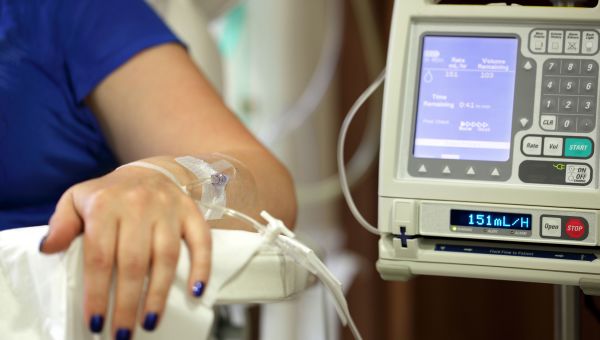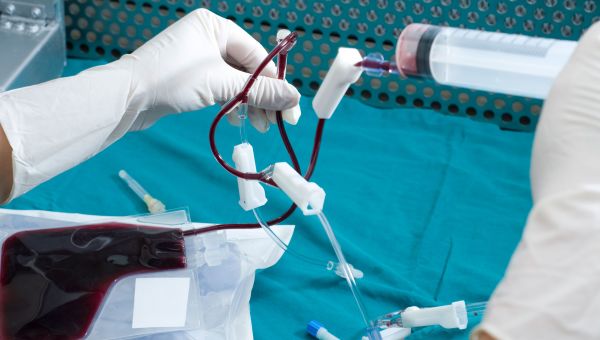Treating an aggressive form of non-Hodgkin lymphoma
Learn about the goals of treatment, the treatment options and the important questions to ask your healthcare team.

Non-Hodgkin’s lymphoma (NHL) is a type of cancer that begins in white blood cells called lymphocytes, which are part of the immune system. There are more than 60 different subtypes of NHL. These are categorized based on the type of lymphocytes in which the cancer cells develop, the appearance of the cancer cells, the genetic features of the cancer cells and other factors.… Show More
Non-Hodgkin’s lymphoma (NHL) is a type of cancer that begins in white blood cells called lymphocytes, which are part of the immune system. There are more than 60 different subtypes of NHL. These are categorized based on the type of lymphocytes in which the cancer cells develop, the appearance of the cancer cells, the genetic features of the cancer cells and other factors.
NHL is also categorized as indolent or aggressive. Indolent NHLs grow slowly, and may not be treated until symptoms appear. Aggressive NHLs spread quickly and will require fast and intense treatment.
Here, you will learn more about the goals for treating the aggressive types of this disease. You will also learn about available treatments, tests used to monitor your condition and questions to ask your doctor.
Show Less
Treatment goals
The purpose of treating any form of cancer is to improve a patient’s health. It is also to extend their lifespan. Though some cases of NHL are difficult to treat, several effective therapies have been found in recent years.
The current, approved treatments for NHL are designed to reduce symptoms of… Show More
The purpose of treating any form of cancer is to improve a patient’s health. It is also to extend their lifespan. Though some cases of NHL are difficult to treat, several effective therapies have been found in recent years.
The current, approved treatments for NHL are designed to reduce symptoms of the disease, which include fever, fatigue, night sweats, enlarged lymph nodes and pain in areas where the tumors may have spread. Treatments are also aimed at destroying existing cancer cells and preventing new cancer cells from growing and spreading.
While patients can go into remission, this type of cancer can return.
Show Less
First-line treatments
If a physician has found that a patient’s cancer is aggressive (fast-growing), there are several first-line treatments available. These include:
- Chemotherapy, also referred to as chemo, uses drugs to destroy cancer cells. There are many chemotherapy drugs available. Some chemotherapies are used on … Show More
If a physician has found that a patient’s cancer is aggressive (fast-growing), there are several first-line treatments available. These include:
- Chemotherapy, also referred to as chemo, uses drugs to destroy cancer cells. There are many chemotherapy drugs available. Some chemotherapies are used on their own; others are combined with one another or with other treatments.
- Targeted therapies are drugs that target specific parts of a cancer cell’s biology, such as a certain protein or gene mutation. Targeted therapies can be combined with chemotherapy. Sometimes they are used when standard chemo treatments don’t work. The side effects from targeted therapies tend to be different and less severe than side effects from standard chemotherapy.
- Radiation therapy uses charged particles to destroy cancer cells. The type of radiation therapy most often used for NHL is called external beam radiation. During this procedure, a machine outside the body precisely targets a tumor site with radiation.
- Immunotherapy refers to a class of drugs that help the body’s immune system fight cancer.
After a patient has completed a first-line treatment, they may be prescribed what is called a maintenance therapy. Maintenance therapy is an ongoing course of medication used to prevent the cancer from returning or to slow the progress of an advanced cancer.
Show Less
Stem cell transplant
If a patient does not respond to treatment, another option is a blood stem cell transplant. This helps the cells that form inside the bone marrow (known as hematopoietic stem cells) develop properly.
When the stem cells used in a transplant come from the patient’s body, it is called an autologous… Show More
If a patient does not respond to treatment, another option is a blood stem cell transplant. This helps the cells that form inside the bone marrow (known as hematopoietic stem cells) develop properly.
When the stem cells used in a transplant come from the patient’s body, it is called an autologous or auto transplant. When they come from a donor who has a similar genetic makeup, it is called an allogeneic transplantation or an allo transplant. A patient who has an identical twin can also receive a transplant from their twin. This is called a syngeneic blood cell transplant.
In the case of an auto transplant, the patient would have their stem cells collected and stored (frozen) before they receive high doses of chemo. A stem cell transplant may also be recommended after a patient completes chemo. Because it’s an intensive procedure, it’s usually prescribed to younger, more fit patients.
Show Less
Tests to monitor NHL
During and after treatment, a patient’s condition will be monitored with scans.
A CT or CAT (computed tomography) scan uses X-rays to create a three-dimensional image of the body’s interior. The scan includes organs, bones, soft tissues and blood vessels and determines a tumor’s shape, size and… Show More
During and after treatment, a patient’s condition will be monitored with scans.
A CT or CAT (computed tomography) scan uses X-rays to create a three-dimensional image of the body’s interior. The scan includes organs, bones, soft tissues and blood vessels and determines a tumor’s shape, size and location. It is a painless outpatient procedure that takes up to 30 minutes.
A whole-body PET (positron emission tomography) scan uses a form of radioactive sugar to find tumors throughout the body. This scan is usually combined with a CT scan.
Blood tests will typically be required during and after treatment, as well.
Show Less
Questions to ask your doctor
If you or someone you love has been diagnosed with an aggressive form of NHL, consider asking your healthcare team the following questions:
- Which treatment options have been proven to work best for someone with my condition?
- How can I best prepare myself for treatment?
- What are the common side … Show More
If you or someone you love has been diagnosed with an aggressive form of NHL, consider asking your healthcare team the following questions:
- Which treatment options have been proven to work best for someone with my condition?
- How can I best prepare myself for treatment?
- What are the common side effects of these treatment options?
- How can I treat these side effects?
- What are the common risks of these options?
- When will we know if my treatment is working?
- Will home health care be needed during treatment?
- What would be the second-line (second choice) treatment if the first-line treatment is not effective?
- Do I qualify for a blood stem cell transplant?
Patients who have been diagnosed with advanced NHL may also want to ask their healthcare provider about entering a clinical trial in order to receive treatments that are currently being investigated.
Show Less
Cancer.net. “Lymphoma - Non-Hodgkin: Subtypes.” August 2019. Accessed October 9, 2020.
Leukemia & Lymphoma Society. “NHL Subtypes.” 2020. Accessed October 9, 2020.
Lymphoma Research Foundation. “About Lymphoma.” 2020. Accessed October 9, 2020.
Lymphoma Research Foundation. “Getting the Facts: Mantle Cell Lymphoma.” July 2015. Accessed October 9, 2020.
American Cancer Society. “Treating Non-Hodgkin Lymphoma.” 2020. Accessed October 9, 2020.
Cancer.net. “Lymphoma - Non-Hodgkin: Symptoms and Signs.” August 2019. Accessed October 9, 2020.
MedicineNet. “Mantle Cell Lymphoma.” 2020. Accessed October 9, 2020.
American Cancer Society. “Chemotherapy for Non-Hodgkin Lymphoma.” August 1, 2018. Accessed October 9, 2020.
National Cancer Institute. “Targeted Cancer Therapies.” September 30, 2020. Accessed October 9, 2020.
Cancer Treatment Centers of America. “Non-Hodgkin lymphoma treatments.” 2020. Accessed October 9, 2020.
American Cancer Society. “Targeted Therapy Drugs for Non-Hodgkin Lymphoma.” June 23, 2020. Accessed October 9, 2020.
American Cancer Society. “Radiation Therapy for Non-Hodgkin Lymphoma.” August 26, 2019. Accessed October 9, 2020.
Merck Manual Consumer Version. “Radiation Therapy for Cancer.” September 2020. Accessed October 9, 2020.
American Cancer Society. “Immunotherapy for Non-Hodgkin Lymphoma.” August 3, 2020. Accessed October 9, 2020.
Cancer.net. “Understanding Immunotherapy.” May 2020. Accessed October 9, 2020.
MedicineNet. “More Aggressive Chemo May Help Younger Lymphoma Patients: Study.” November 24, 2011.
NH Fowler. “Role of Maintenance Rituximab (Rituxan) Therapy In the Treatment of Follicular Lymphoma.” P & T: A Peer-Reviewed Journal for Formulary Management. September 2011. 36(9), 590–598.
Cancer.net. “Understanding Maintenance Therapy.” May 2019. Accessed October 9, 2020.
Cancer.net. “Bone Marrow/Stem Cell Transplantation.” 2020. Accessed October 9, 2020.
American Cancer Society. “Types of Stem Cell and Bone Marrow Transplants.” March 2020. Accessed October 9, 2020.
American Cancer Society. “Getting a Stem Cell or Bone Marrow Transplant.” March 2020. Accessed October 9, 2020.
MedlinePlus. “Pelvic CT scan.” December 23, 2018. Accessed October 9, 2020.
American Cancer Society. “CT Scan for Cancer.” November 30, 2015. Accessed October 9, 2020.
National Cancer Institute. “PET scan.” 2020. Accessed October 9, 2020.
American Cancer Society. “Nuclear Medicine Scans for Cancer.” August 29, 2019. Accessed October 9, 2020.
Leukemia & Lymphoma Society. “Treatment for Aggressive NHL Subtypes.” 2020. Accessed October 9, 2020.
National Cancer Institute. “Hematopoietic stem cell.” 2020. Accessed October 13, 2020.
Johns Hopkins Medicine/The Sidney Kimmel Comprehensive Cancer Center. “Types of Bone Marrow Transplants.”
Sarah C. Rutherford. “Surveillance Scanning in Lymphoma.” Clinical Advances in Hematology & Oncology. June 2019 - Volume 17, Issue 6.
More On


video

slideshow


video


video
